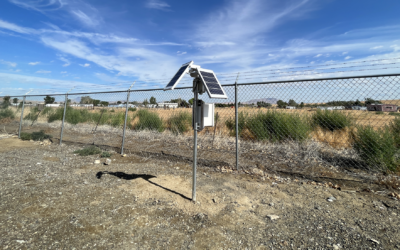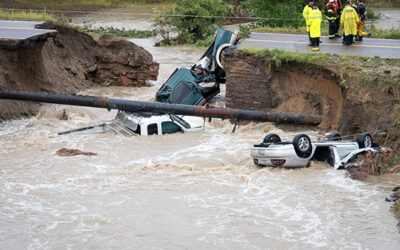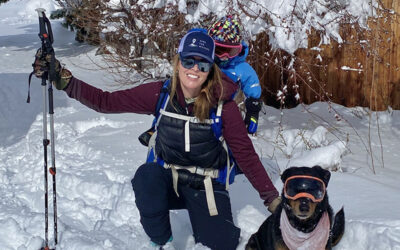To help Arizona teachers develop science lesson plans that relate to the cultures and life experiences of indigenous students, researchers from the Desert Research Institute (DRI) recently held a two-day workshop on place-based education at northern Arizona’s STAR School, as part of the Native Waters on Arid Lands (NWAL) project.
“Place-based education utilizes elements of the familiar, such as local landscapes, resources, and experiences, as a foundation for the study of more complex topics,” explained Meghan Collins, M.S., Assistant Research Scientist at DRI and NWAL’s Education Lead. “In this case, we worked with teachers to draw meaningful connections to some of our main project themes of water for agriculture and people, drought and climate connections, and solar energy.”
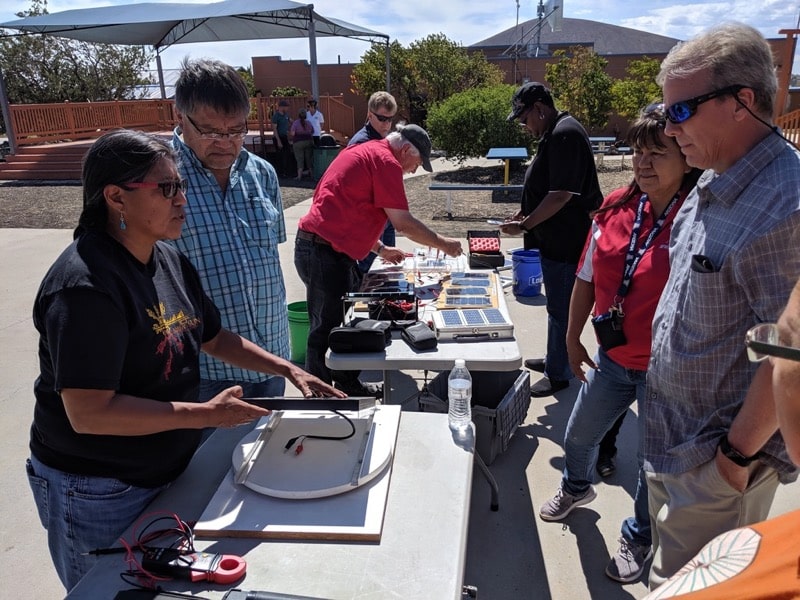
Workshop participants engage in a hands-on demonstration related to solar power at NWAL’s teacher workshop in Arizona. September 14, 2019.
Fourteen teachers attended the September workshop, including K-12 and GED adult educators from the Hopi, Navajo, and Tohono O’odham communities of Arizona. The workshop began with a day of seminars, discussions, and hands-on demonstrations led by researchers from DRI and the University of Arizona (UA). Activities were aimed at helping teachers gain a thorough understanding of the subject matter, and incorporated data and information relevant to reservations of Arizona.
Ed Franklin, Ph.D., (UA) led a professional development seminar on solar energy, using locally-appropriate methods and hands-on examples to demonstrate how solar panels can be used to generate energy and pump water. NWAL team member Alex Lutz, Ph.D., (DRI) led the group through a lesson in water quality, with a focus on salinity and total dissolved solids, using maps of water contamination from the Hopi and Navajo reservations and a hands-on exercise with salinity-meters. NWAL team member Kyle Bocinsky, Ph.D., (DRI/Crow Canyon Archaeological Center) led a seminar on climate and weather patterns, comparing modern-day climate conditions with paleo data from the last 1000 years, through an examination of the local tree ring record.
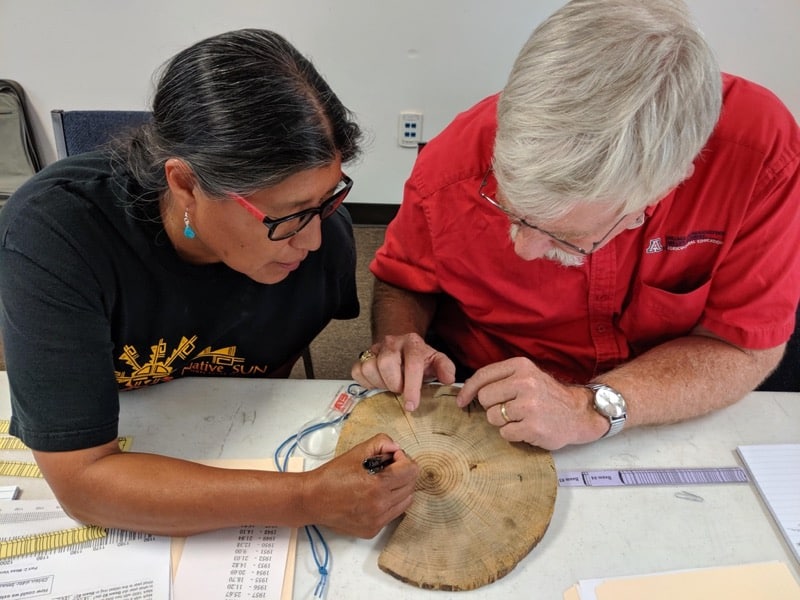
Workshop facilitators and participants counted tree rings as part of Kyle Bocinsky’s dendrochronology demonstration at NWAL’s teacher workshop. Sept 14, 2019.
On the second day of the workshop, NWAL team member Meghan Collins facilitated the group to use a template for developing place-based lesson plans. Teachers and scientists then worked together to create place-based lesson plans that incorporated the requirements of Arizona State Science Standards.
The lesson plans connected elements of each school’s local landscapes and resources with the science lessons from the NWAL/UA researchers. One teacher, who came from a community that will soon be constructing a new school, developed a lesson plan that asked students to calculate whether their new school’s energy needs could be met by solar energy. Another teacher developed a lesson plan for students to collect water quality samples from around their community and have them tested for arsenic, which is present in certain areas of the Hopi Reservation.
“One of the most important parts of this workshop was that the teachers had face-to-face contact with the researchers, so they could develop an understanding of the science that was presented and turn that into something they could teach,” said NWAL Program Director Maureen McCarthy, Ph.D., (DRI/University of Nevada, Reno). “This workshop was a clear demonstration of our team being able to translate research into tangible outcomes that our tribal partners can use.”
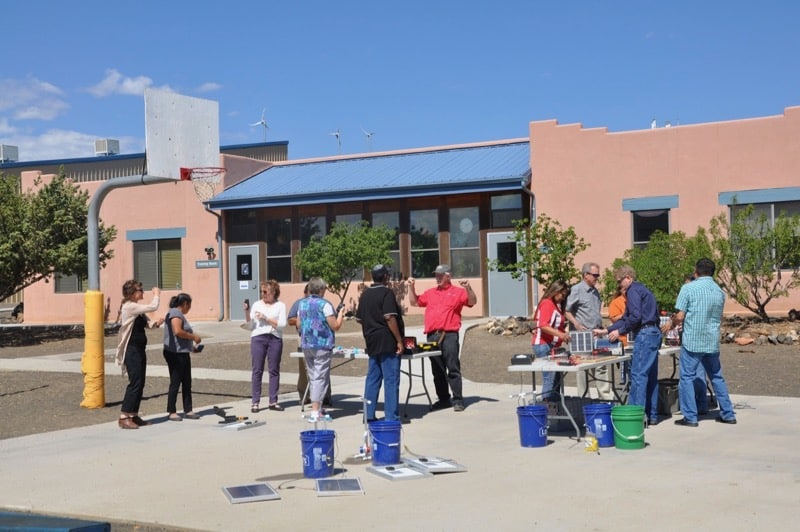
Workshop participants gather outside of the STAR school for a demonstration on solar power by Ed Franklin of University of Arizona. Sept. 14, 2019.
The idea for the teacher training was sparked during a climate-agriculture resiliency workshop that NWAL held for members of the Hopi and Navajo tribes during March 2019, which centered around the idea of making climate data useful for farmers and ranchers in native communities. Several teachers were in attendance, and wanted to know how to bring local climate science data into their classrooms for the benefit of young and future generations.
The NWAL team planned the September teacher’s workshop and recruited participants, with help from Trent Teegerstrom (UA Tribal Extension Program), Ed Franklin (UA), and Susan Sekaquaptewa (University of Arizona Hopi FRTEP Agent). The STAR school provided a venue, and the director and teachers from the school participated in the workshop and provided a tour of their impressive facility.
“This workshop was an experiment, but it worked extremely well, so we’re going to build on this to do additional workshops this year or next,” McCarthy said.
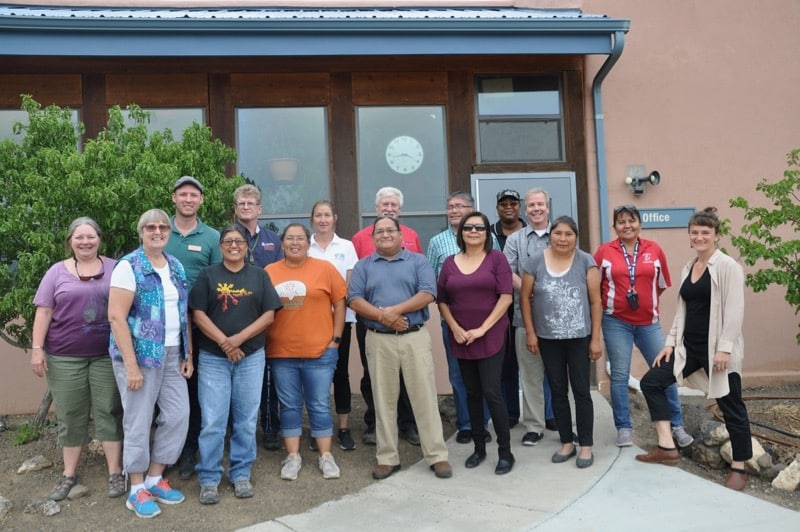
Facilitators and participants from NWAL’s teacher workshop on place-based education. STAR School, September 14-15, 2019.
The Native Waters on Arid Lands project partners researchers and extension experts with tribal communities in the Great Basin and American Southwest to collaboratively understand the impacts of climate change, and to evaluate adaptation options for sustaining water resources and agriculture. Partners in the project include the Desert Research Institute; the University of Nevada, Reno; the University of Arizona; First Americans Land-Grant Consortium; Utah State University; Ohio University; United States Geological Survey; and the Federally Recognized Tribal Extension Program in Nevada and Arizona. This project is funded by the U.S. Department of Agriculture’s National Institute of Food and Agriculture. To learn more, please visit: http://nativewaters-aridlands.com.
